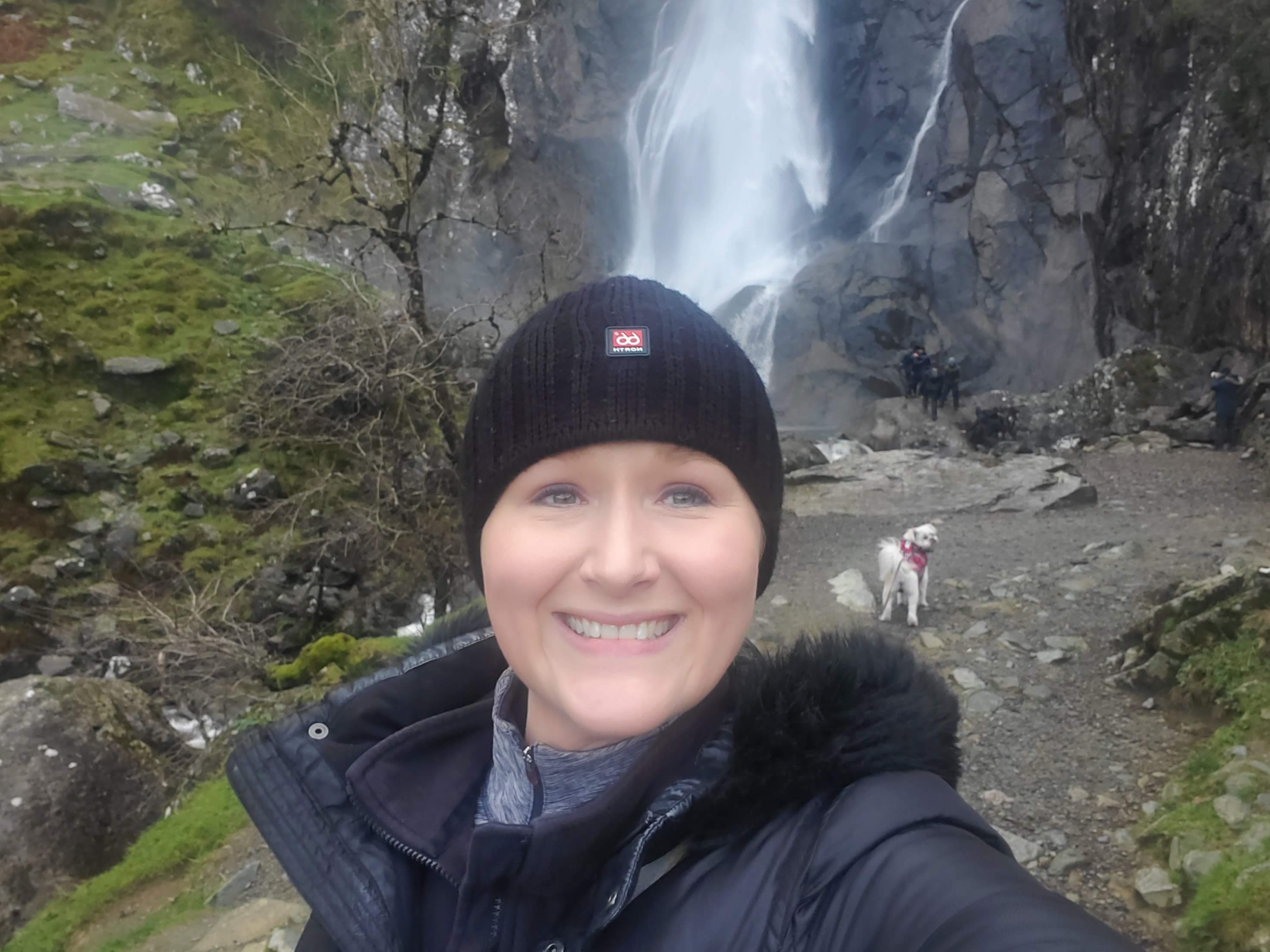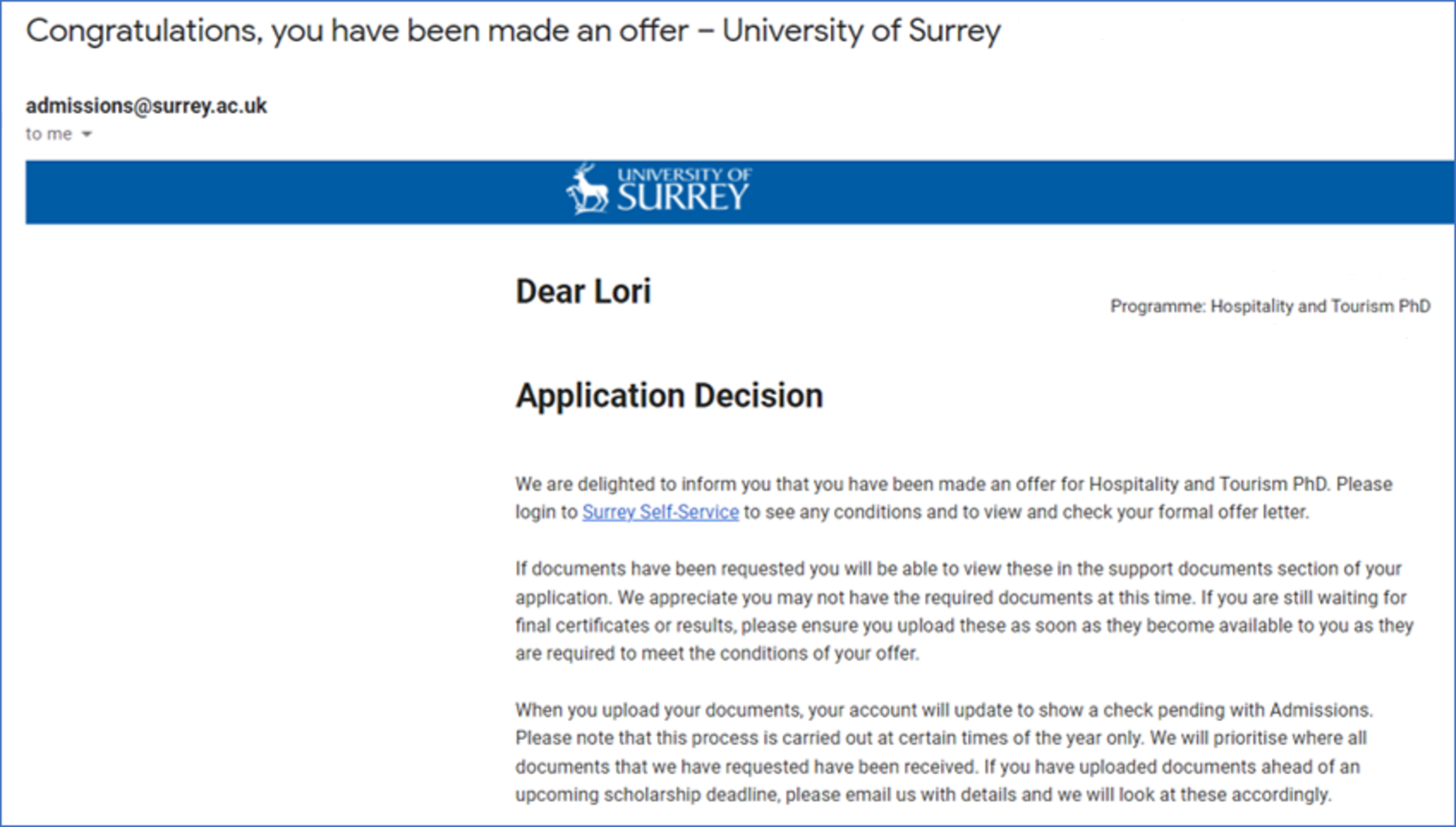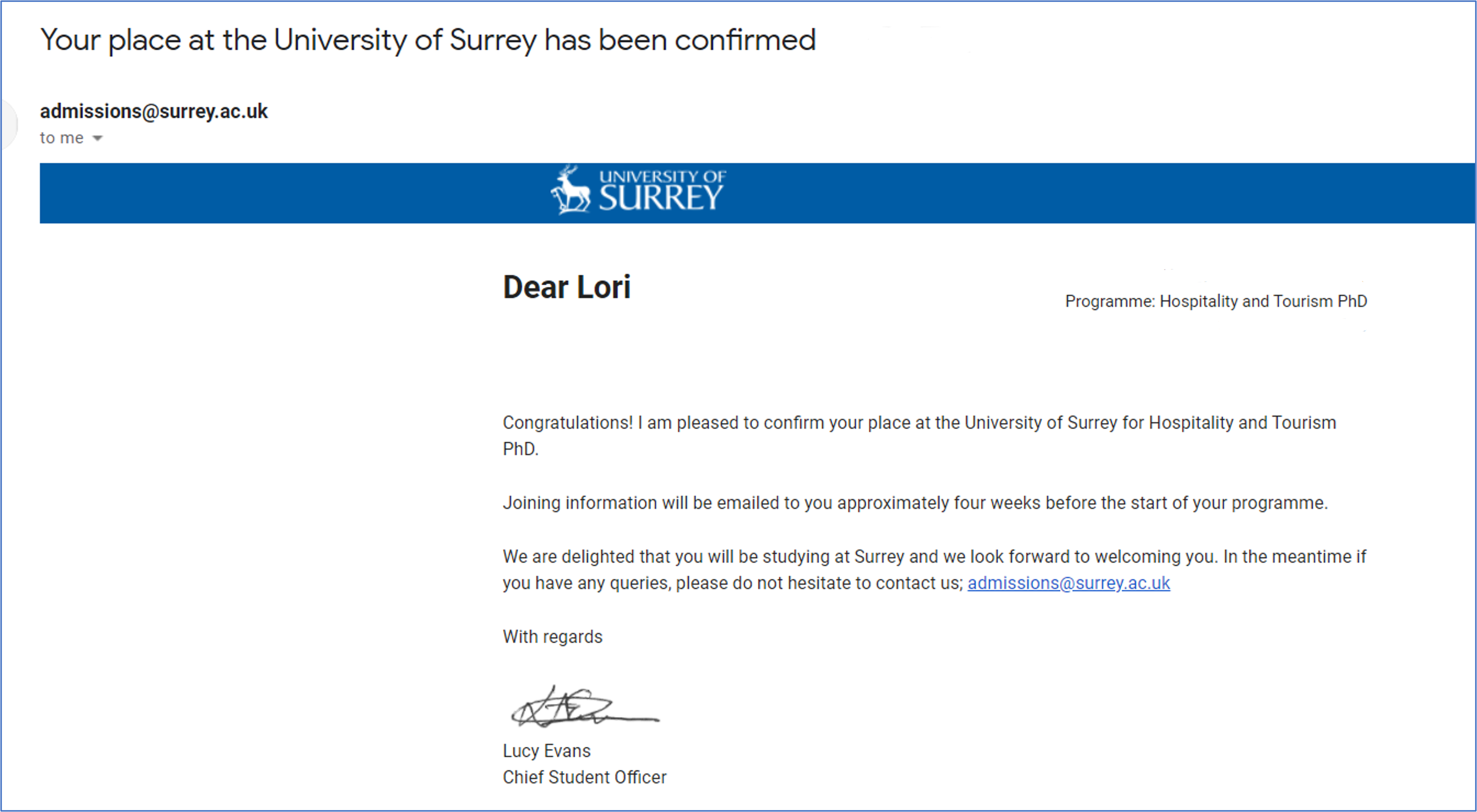I have been interested in doing a PhD for as long as I can remember. I was attracted to the idea of developing my knowledge in a subject that interested me, doing original research on that topic, and the possibility of an academic or industry research career. However, there was one problem. I had no idea in which field I wanted to do a PhD, let alone the subject that I wanted to focus on for my PhD thesis.
My background is entirely in marketing. I have worked for quite a few years doing a range of marketing roles in various industries. I have both an MBA specialising in Marketing (University of Miami) and an MSc in Tourism Marketing (University of Surrey). However, I was not sure that I wanted to do PhD in marketing. I made a point of keeping in touch with my MSc supervisor at the University of Surrey over the years and we had more than one discussion about possible options for a PhD in Hospitality and Tourism Management. Despite staying in contact with her, it never seemed the right time nor had I found a research topic that truly interested me.
Finding a Research Area of Interest

Everything changed after I adopted my rescue dog, Princess Buttercup. I was back in the US after dealing with some family medical issues and I was volunteering at an animal shelter. I fell in love with this little Shih Tzu mix dog who had been picked up as a stray on the street. I adopted her and we soon started on our adventures. We went on hikes in the mountains, travelled around the US in the car and by plane, and she even went to places like the cinema, restaurants, and outdoor art fairs with me.
That is when the idea for a potential thesis topic hit me! I loved participating in travel and leisure with my dog, so I wondered if much academic research had been done in the area. I started chatting with my friends about my potential PhD thesis topic and then reached out to my former MSc dissertation supervisor at the University of Surrey. She thought that the idea of doing research about how pet ownership affects the decisions and behaviours of people when participating in travel and leisure might have some merit. She recommended that I go and look for industry publications and news stories related to pet owners’ feelings, thoughts, and decisions around travelling or participating in leisure with their pets to gauge the general interest in the topic. I found lots of reports and articles, so my supervisor and I had another discussion about how to proceed with the application process.
Programme Criteria & Research Match
Once I had my research area of interest and an idea for the thesis it was time to check a few other details around the PhD in Hospitality and Tourism Management at the University of Surrey. First, I checked the programme’s key information such as start dates, entry requirements, and the application process (Criteria for each programme can be found here). I also had a look at the School’s Centres of Research that focus on the key research themes being explored in the Department of Hospitality and Tourism. Thankfully, my research seemed a good match for the Centre for Sustainability and Wellbeing in the Visitor Economy (SWELL). This meant that my research would fit well within the current research going on at the School of Hospitality and Tourism Management and that it would be possible to match me with a secondary supervisor within the relevant research centre.

Finding a Supervisor:
I was lucky in that I already knew my previous MSc dissertation supervisor, and she was interested in supervising me as a PhD student. However, even before completing my MSc, I had reached out to some of my other lecturers at Surrey and they were always very happy to discuss their research and potential topic ideas for a PhD at the University. I would always encourage anyone thinking about a PhD to look at the research centres/groups at their department of interest. If you look at the department’s ‘Themes and Facilities’, then you will find out a lot more about the research that is being done. Plus, you can view the staff in that department and their interest areas. Then you can get in touch with researchers whose interests might align well with yours. Potential supervisors really are happy to be approached and discuss your ideas.
Funding Options:
One of the next things that I did in the application process after I had a potential PhD topic was to investigate funding options. It is worth checking out what studentships are available on findaphd.com, jobs.ac.uk, or Surrey’s studentship page. Funded studentships can also be a great way to find topics that you will be paid to research or simply provide inspiration for another topic that may be of interest to you. Unfortunately for me as an international student, none of the studentships were a good match for me because many were only available for UK or EU candidates or did not fit my attendance timeline. However, if you are an international student, do not let this discourage you. There are usually other scholarship opportunities and funding options from your home country. Make sure to look into these options for funding your PhD!
Writing a Research Proposal:
The next step for my application process was to write a proposal. The School of Hospitality and Tourism Management application process required that I write a 5000-word proposal outlining an introduction to my proposed topic, a basic literature review, a proposed methodology, and a plan with timetable of how I would complete the PhD.
One of my biggest pieces of advice if you are required to write a PhD proposal for your application is to not worry about the details of the proposal because these will almost certainly change once you are in your PhD. What mattered most for my proposal was that: 1) the topic had academic and managerial relevance, 2) I had searched for what research had already been done and my research would fill a knowledge gap, and 3) I possessed a basic understanding of the methodology and the planning required to carry out a three-year research project. In the end it was quite fun doing the research proposal for my application because I got to learn more about my proposed topic, plus it was an outlet to share information about the topic that had me so excited.
Applying Online:
While I was working on the proposal, I also contacted some referees who would be willing to recommend me for the PhD programme. Two referees are required, but I reached out to three: a former work supervisor, former volunteer manager, and a former colleague. They were all willing to submit a letter of recommendation on my behalf, so I was able to list them on my application. The University contacts the referees directly about the recommendation letter, but I wanted to make sure that they were comfortable providing the reference and knew to expect the request.
Finally, I completed and submitted the online application with my information, CV, proposal, and referees.

Timeline of My Application Process:
- 18 July 2019: Contacted previous dissertation supervisor about PhD research topic idea
- 19 July – 19 August 2019: Drafted Research Proposal
- 30 July 2019: Reached out to 3 potential referees for my application
- 20 August 2019: Submitted full application online
- 18 October 2019: Skype interview with my proposed supervisor and a 2nd supervisor proposed by the School
- 30 October 2019: Given a conditional offer pending the submission of my previous university transcripts
- 31 October 2019: Provisionally accepted pending unconditional offer, my deposit, and visa sponsorship
- 6 November 2019: Given an unconditional offer for the PhD in Hospitality & Tourism Management
- 11 November 2019: My place in the PhD programme was confirmed
- November 2019-March 2020: Applied for UK visa, organised logistics of my move, secured UK accommodation, booked flights, planned my dog’s relocation
- 6 April 2020: Officially started as a PhD student in Surrey’s School of Hospitality and Tourism Management

Everyone’s application experience and timeline are different. Overall, my experience of applying for a PhD programme at the University of Surrey was fairly straightforward and easy.
The team in Admissions are very helpful and are there to answer any of your questions. I had quite a few questions along the way and received timely and helpful responses from both the University’s Admissions team and my School’s faculty and staff.
Feel free to get in touch with Admissions at admissions@surrey.ac.uk with any questions and with potential supervisors to take the next step in your application for a PhD at Surrey. I wish you the best of luck in your application to your chosen PhD programme!
